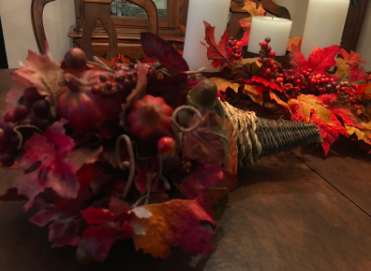The Irony of Thanksgiving
Editor’s note: The following is an opinion article. The opinions presented are the writer’s own and are not representative of the Trailblazer newspaper staff or Pascack Hills High School.

From the Macy’s Thanksgiving Day Parade to subtle family gatherings, Thanksgiving is one of the quintessential American holidays. Growing up, some of my favorite memories are from celebrating Thanksgiving dinner at my aunt’s house. On the surface, this is a great holiday filled with family fun and delicious food.
However, beneath the surface, the story of Thanksgiving goes beyond what we were taught in school. We learned about Squanto, a Patuxet Indian, who was the famous Native American who shared the Thanksgiving feast and helped teach the Pilgrims to grow crops. Squanto was also the chief of the Wampanoag tribe. We didn’t learn though, and probably few of us ever wondered: why wasn’t he the chief of his own people, the Patuxets? Very simply: they had all been wiped out from smallpox and other diseases, were sent to become slaves in England, or had been murdered.
The Thanksgiving we know today originated from the annual Green Corn Festival of the Pequot tribe. As anyone who has taken US History may know, the Pequot war, in which the Pequots faced the deadly team of English, Narragansetts, and Mohegans, was the bloodiest Native war to ever be fought. Consequently, the Pequot tribe was nearly wiped out. The few survivors were enslaved or forced to move west to the land of the unknown as the English settled in the place the Pequots had once called home.
As you can see, there is more to the classic American holiday than smiling pilgrims and Natives putting aside their differences and sharing a communal meal. Nevertheless, we continued to support the celebration of a holiday with such a dark and bloody past.
Today’s tumultuous political climate has dragged this discussion into the spotlight. Many cities such as San Diego and New York have voted to take down statues of Christopher Columbus- a well known explorer of the New World, and lesser known assassin of Natives. An interesting article interviewed several Natives and asked them if they celebrated Thanksgiving. This issue even divides Natives; some participate, taking the position that because they are descendants of the lucky few to survive the genocide, they have reason to give thanks. Others view the holiday as offensive – “a glorification of the persecution of their ancestors” – and support renaming the holiday as “Indigenous People’s Day.” Some nations, such as the Oneida, do not recognize Thanksgiving at all simply because they have their own ceremonies in their culture that express thanks and gratitude, and don’t feel the need to participate in a holiday from a culture different than their own.
Yet the question begs to be answered: should Thanksgiving be celebrated? The responses are inconsistent.
Pascack Hills sophomore Sophomore Nicole Sen thinks that Thanksgiving should be celebrated because “it gives you an opportunity to spend day with your family and friends, it’s an extra day off of school, and it’s an American tradition.”
When I asked her to consider the history behind it, she stood her ground and maintained that the holiday itself is not symbolic of its controversial history and is primarily about being thankful.
I also asked Cole Bushell and Jess Gudin, both sophomores at Pascack Hills, their opinions on Thanksgiving, and they gave me very similar answers. Cole views Thanksgiving as a holiday that brings family together. Jess thinks that we should remember the history and reflect on how we have evolved, but the holiday should not be done away with because it is an American tradition. They all understand the history behind this holiday, however believe that it has been transformed into something completely different and that the history behind it is irrelevant.
Although there’s no correct answer, most Americans do not consider the history when celebrating this all-American holiday. Many do not even know the history. However, it is time that we start considering it. Perhaps we shouldn’t do away completely with this holiday; however, out of respect for the Native Americans, we should change the way we teach about Thanksgiving- especially what we tell our children. Modern day Thanksgiving is a beautiful celebration of gratitude, but we must do our best to remember the history; when history is forgotten, mistakes risk being repeated.
This Thanksgiving, as you are eating your turkey and seeing your family, take a minute to reflect on the thousands of lives lost during the Pequot War; think about how the Native American population went from roughly 112 million to about 6 million in 200 years. Remember the diseases spread, villages destroyed, and people killed. Although this holiday has an atrocious past, if we learn about it, we can make it right in the future by paying respects to the lives lost and the communities affected.











































Ken Clark • Dec 7, 2018 at 1:05 PM
I enjoyed your article and agree America should better educate its youth on factual American history rather than folklore. However, to better understand that period in American history you must have a better understanding of the world and the power broker countries of the times. It should be noted that Columbus, native Americans, and pilgrims, had no inclination they were the beginning of a new country that would one day be called the United States of America. Most were simply trying to survive. The question is, to what extreme would any man go to survive. Yes, it was brutal, but the entire world was brutal.
The world was a different place back then. The mindset of people and their governments were vastly different than today. Atrocities occurred long before that period, during that period, and continue to this very day. During that period, countries needed to expand to survive, although greed also played a significant role. Survival, greed, and power is at the root of every war.
I don’t know if Columbus treated natives any differently than those people treated by invading forces of expansion countries. Today we call Columbus’s treatment of native Americans atrocious, but wasn’t that the way of the world at the time? As sad as it is, it seems this atrocious behavior was acceptable back then. Is it wrong to say populations were raised in a manner that they knew this was just the way the world and it was acceptable? I’m certainly not justifying or condoning it but rather trying to make the point it was a different world and a different mindset throughout all populations.
Nobody in the world today took part in the heinous treatment of native Americans, we were born into a world that existed before us. All we can do as ancestors is prevent it from happening again. This is why the truth in American history needs to be taught in schools, so it never happens again and to remind us of the tragedies of both American natives and the slaves that were brought here against their will. We can’t change history, but we must remember it. To remember and understand the truth and reality of the pain and suffering people went through ought to be enough to prevent it from ever happening again.
Modern-day atrocities continue to this day in the middle east and they feel justified in their cause. Do we forever blame the ancestors of these people? Of course not, but we should never forget. I’m certainly not a historian, not by any stretch of the imagination, so please feel free to criticize my views.